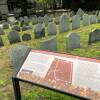Advisory: This story includes descriptions of violence, abuse and oppression of Black people, which were the norm in colonial-era Boston.
Visitors to Copp’s Hill Burying Ground in the North End will find the resting sites of well-known white families. But the city's second oldest cemetery also is the burial site of more than 1,000 free and enslaved Black people whose identities remain largely unknown.
The burial ground was described in a 1851 catalog of gravesites as a place where “many of the fathers of New England were buried.” Most notably, the cemetery houses the tomb of the Mather family — Increase, Cotton and Samuel Mather — described at the site as “the most celebrated family of Puritan ministers.”
Cotton Mather launched a campaign to educate and convert enslaved people to Christianity, assuring other slave owners that baptism would not lead to freedom because the Bible recognized and endorsed slavery. A man named Onesimus, who was enslaved by Mather, introduced him to the African concept of smallpox inoculation. Mather was fascinated by the practice and helped launch the colonies’ first vaccination campaign.
The burial ground is at the fringes of Boston’s North End, where a community of free Black people sprung up by the middle of the 1600s and became known as “New Guinea.”
There are few marked graves or details of the Black people buried here, with one very notable exception: Prince Hall, an abolitionist leader and founder of the first Black freemason lodge in America.
Hall was likely born enslaved, but it was as a free man that he drafted several petitions to colonial authorities in the 1770s seeking the liberation of slaves. In 1787, he wrote a petition objecting to the exclusion of Black children from schools.
Hall and 213 other Black men attempted to join a Boston Freemason lodge and were rejected. They instead applied to an Irish lodge attached to British soldiers stationed on Castle Island, where they were admitted in 1775. In 1784, they were granted their own charter for what became African Lodge #459, the first lodge of Blacks in America.
This story is part of the project Enslavement History of the Freedom Trail, a collaborative effort between GBH News and Boston University students to detail the mostly hidden history behind some of Boston's most well-known sites.







